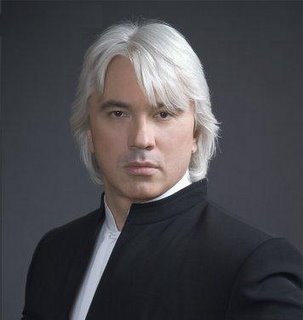From Russia with Love: Hvorostovsky
 Last Tuesday, Washington Performing Arts Society presented Russian baritone Dmitri Hvorostovsky, the superb Academy of Choral Art Adult Chorus, Moscow Chamber Orchestra, and Style of Five Folk Ensemble in a powerful concert of beloved Russian sacred, operatic, and folk favorites, as part of a North American tour. The program opened with moving sacred works incorporating texts from the Orthodox liturgy and Bible for choir and baritone by Bornyansky (1751-1825), and works by three composers from the turn of the 20th century: Tolsyakov, Arhkangel’sky, and Chesnokov. Specializing in the revival of early Russian religious music, the virtuosic 40-member mixed adult chorus of Moscow’s Academy of Choral Art had reedy fff moments and a rich tone quality the rest of the time. The religious works on the program were performed with the conviction of an African-American spiritual, while Hvorostovsky’s fast, narrow vibrato allowed his rather heavy voice to lighten and soar above the chorus. The last chord of a few of the works ended with a gripping crescendo more forceful than any full orchestra these ears have ever heard in Strathmore’s hall.
Last Tuesday, Washington Performing Arts Society presented Russian baritone Dmitri Hvorostovsky, the superb Academy of Choral Art Adult Chorus, Moscow Chamber Orchestra, and Style of Five Folk Ensemble in a powerful concert of beloved Russian sacred, operatic, and folk favorites, as part of a North American tour. The program opened with moving sacred works incorporating texts from the Orthodox liturgy and Bible for choir and baritone by Bornyansky (1751-1825), and works by three composers from the turn of the 20th century: Tolsyakov, Arhkangel’sky, and Chesnokov. Specializing in the revival of early Russian religious music, the virtuosic 40-member mixed adult chorus of Moscow’s Academy of Choral Art had reedy fff moments and a rich tone quality the rest of the time. The religious works on the program were performed with the conviction of an African-American spiritual, while Hvorostovsky’s fast, narrow vibrato allowed his rather heavy voice to lighten and soar above the chorus. The last chord of a few of the works ended with a gripping crescendo more forceful than any full orchestra these ears have ever heard in Strathmore’s hall.
The precise Moscow Chamber Orchestra joined in for arias and choruses from Rimsky-Korsakov’s The Tsar’s Bride and Tchaikovsky’s Eugene Onegin and The Queen of Spades, each featuring the dark sentimentality of the Russian temperament. As in his last visit to the area, Hvorostovsky conveys this affect well, though the theme of mourning lost love continued for the next dozen or so arias and songs – most of the rest of the program – perhaps becoming rather stale. Most memorable was Yeletsky’s Aria from The Queen of Spades, where Hvorostovsky’s beautiful begging for the lady’s ear was overwhelming. Hvorostovsky’s unrivaled breath control and impeccable tuning were gripping.
Arthur Kaptainis, From Russia, classical to pop (Montreal Gazette, November 26)
---, Opera pop phenom (Montreal Gazette, November 22)
Daniel Ginsberg, With Russian Love Songs, Baritone Woos His Audience (Washington Post, November 22)
Fred Kirshnit, A Rare Bird of Paradise (New York Sun, November 19)
Bernard Holland, The Russian Songbook, Under Western Influence (New York Times, November 17)
Scott Cantrell, Russian program proves intriguing, if a bit schlocky (Dallis Morning News, November 7)
A trio of instrumentalists from the Style of Five Folk Ensemble then joined Hvorostovsky, chorus, and orchestra for selections of Russian folk songs and popular music. When Western youths rebelled against the establishment through the Beatles, Stones, and Elvis, Soviet popular music remained more traditional, judging by its use of folk instruments over drum sets. The lyrical songs of love and longing were truly lovely until Hvorostovsky began using a microphone partway through the second half, thus ruining the acoustic balance of Strathmore’s hall.
The next classical concert sponsored by WPAS features the Philadelphia Orchestra, in the Kennedy Center Concert Hall (December 6, 8 pm). Instead of Christoph Eschenbach, James Conlon will conduct a memorable program combining Varèse's Amériques and Ravel's La Valse with Hélène Grimaud playing Beethoven's Emperor Concerto. A few tickets remain unsold.





















































No comments:
Post a Comment